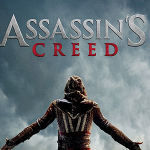December 21st is the date that the hotly anticipated Assassin’s Creed, the movie, is released.
Revolutionary technology unlocks his genetic memories allowing Callum Lynch, played by Michael Fassbender, to experience the adventures of his ancestor, Aguilar.
In 15th Century Spain, Callum discovers he descends from a mysterious secret society known as the Assassins. He acquires knowledge and skills to take on the oppressive, powerful Templar organisation in the present day.
It sounds far-fetched, a typical product of Hollywood special effects and the writer’s imagination, but genealogists have long understood that our ancestors from centuries past influence how we act and behave today.
Scientific basis
For anyone studying genealogy courses, they will come across personal stories that show the ups and downs of life.
They will trace their ancestors who will have lived through golden times, as well as turbulent ones. And it seems that there is a scientific basis for these good and bad times to affect the genes of those that lived through them, and any offspring from then on.
Callum Lynch travels back to the 15th Century, but the science has yet to prove anything beyond grandparents. But there is a very real impact on what your ancestors did and lived through on your genetic make-up today.
The science is still unfolding; especially in terms of human subjects, but there has been in-depth study of rats, specifically mother rats and their offspring.
The experiments are deceptively simple. Mother rats whose offspring was handled for five to fifteen minutes a day were better mothers. Their offspring were calmer with the mother rat more tactile, grooming them and allowing them more space to feed.
Mother rats whose offspring were not handled by humans seemed more distant from their offspring, indulging in what is known as arch-back parenting. They carried their babies on their backs and did not interact as they fed.
The genes had not changed but there was, as the leading geneticists have chosen to describe it, a fine powder sprinkled across the genes when the rats suffered from poor parenting. In humans, this ‘fine dust’ is known as methyl, an organic compound that sits external to DNA.
In the rat offspring nurtured, it wasn’t there. In the rats that were not treated well by their mother, it was. And when it was present, the rats were more reactive in certain situations – they were skittish around humans, unpleasant to one another and so on.
The human sample is small, but the results are similar. Studying the DNA for methyl attached to the DNA of 14 Russian orphan children compared to 14 children brought up by their biological parents showed a marked difference.
So, when we look back at our ancestors, the winning of the lottery by the parents of a two-year old child and that of a two-year old child whose parents were made bankrupt, will show a difference in the level of methyl on the DNA.
It seems that as our ancestors lived, like fine dust, everything that affected them, good or bad, did have an impact on their genes – which means that our genes are affected too.
All nature and no nurture?
There has long been a debate regarding nature vs. nurture. It seems that the science confirms that some behaviours are inherent to our genes, but psychologists say that with the right input, these negatives can be changed just as with the wrong input, people can become something else entirely.
But what does it mean for those studying genealogy courses?
It may mean that the stories of the past have a direct impact and influence on the people of today, something that we may have felt has always been the case, but there has been no science to prove it. But that could now become a reality.
Why study genealogy?
Genealogy courses open you to a whole new world. It is a chance not only to trace a family tree, but to delve deeper and find the personal stories within the feats, adventures and changes that societies and cultures have lived through.
These deeply personal stories of your ancestors will and do affect you today. The revolutions of the past do have an impact on how we react to challenges in the present day.
As well as using your newfound skills for yourself, you could also offer your services to other people, researching and finding the stories of their ancestors.
Perhaps there is some truth in Assassin’s Creed and the adventures of Callum Lynch in 15th Century Spain as he fights his modern-day foe?








